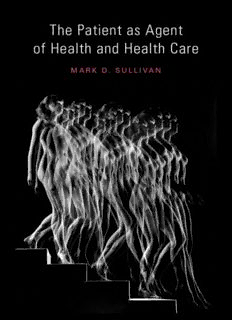
The Patient as Agent of Health and Health Care: Autonomy in Patient-Centered Care for Chronic Conditions PDF
Preview The Patient as Agent of Health and Health Care: Autonomy in Patient-Centered Care for Chronic Conditions
i The Patient as Agent of Health and Health Care ii iii i The Patient as Agent of Health and Health Care Mark D. Sullivan i 1 iv 1 Oxford University Press is a department of the University of Oxford. It furthers the University’s objective of excellence in research, scholarship, and education by publishing worldwide. Oxford is a registered trade mark of Oxford University Press in the UK and certain other countries. Published in the United States of America by Oxford University Press 198 Madison Avenue, New York, NY 10016, United States of America. © Mark D. Sullivan 2017 All rights reserved. No part of this publication may be reproduced, stored in a retrieval system, or transmitted, in any form or by any means, without the prior permission in writing of Oxford University Press, or as expressly permitted by law, by license, or under terms agreed with the appropriate reproduction rights organization. Inquiries concerning reproduction outside the scope of the above should be sent to the Rights Department, Oxford University Press, at the address above. You must not circulate this work in any other form and you must impose this same condition on any acquirer. CIP data is on file at the Library of Congress ISBN 978– 0– 19– 538658– 5 9 8 7 6 5 4 3 2 1 Printed by Sheridan Books, Inc., United States of America v Perhaps it is necessary that the actuality of the agent and that of the patient should not be the same. The one is “agency” and the other “patiency”; and the outcome and comple- tion of the one is an “action,” that of the other a “passion.” Since then they are both motions, we may ask: in what are they, if they are different? Either (a) both are in what is acted on and moved, or (b) the agency is in the agent and the patiency is in the patient. Aristotle, Physics III, 3 In terms of the medieval distinction between “the patient” and “the agent,” this freedom- centered understanding of development is very much an agent- oriented view. With ade- quate social opportunities, individuals can effectively shape their own destiny and each other. They need not be seen primarily as passive recipients of cunning development programs. There is indeed a strong rationale for recognizing the positive role of free and sustainable agency— even of constructive impatience. Amartya Sen, Development as Freedom vi vii i Contents part one | Introduction 1. Patient- Centered Medicine: Who, What, and How? 3 2. Patient- Centered Care or Patient- Centered Health? 16 part two | Beyond Bioethics 3. Respecting and Promoting Patient Autonomy in Research, End- of- Life Care, and Chronic Illness Care 41 4. Escaping the Autonomy Versus Objectivity Trap by Repersonalizing the Clinical Problem 75 part three | Health Perceived by the Patient 5. Health- Related Quality of Life as a Goal for Clinical Care 109 6. Health as the Capacity for Action 145 part four | Health Produced by the Patient 7. On the Role of Health Behavior in 21st- Century Health 169 8. Advancing from Activated Patient to Autonomous Patient 192 part five | Health Despite Disease 9. Finding Health Between Personal and Disease Processes 231 10. Seeking the Roots of Health and Action in Biological Autonomy 266 vii viii viii i Contents part six | Patient- Centered Health Policy 11. Make the Patient the True Customer for Health Care 305 12. Patient- Centered Health Is Produced by Patients 342 References 383 Index 431 1 part one Introduction i
Description: